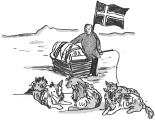

Barely a day passes and the men are already thrown into preparations for the second depot journey. Amundsen paces back and forth, consumed by the question of weight. He knows significant reductions are possible and devotes all his energy to imagining the ways this can be achieved. If they can pack provisions more efficiently, that will reduce the burden on the dogs. With lighter loads the sledges themselves could be downsized. The heavy rigid sledges they’ve brought from Norway are simply not necessary. What they need are light, flexible sledges like the ones used by the Netsilik. Stubberud could easily strip them back. In pondering the question of weight, it has occurred to the chief that another way to lessen their load is to leave men behind. Fewer men require fewer provisions. But the question of which men to take and which men to leave is a tricky one. Helmer is his right-hand man. Sverre is highly experienced with dogs. Bjaaland’s the champion on skis, and fast. Prestrud and Oscar are green but diligent workers. Stubberud’s handyman skills could be lifesaving on the trail. And Johansen has survival knowledge the others lack. Thank goodness Fatty is not built for sledging. That’s one man he can leave out. Perhaps by the end of winter, he’ll have a firmer view.
‘I really, really hate these boots,’ Prestrud says, slicing away the canvas from the sole with a heavy pair of scissors. On his face is a look of pure glee. ‘I feel like a surgeon.’
‘I prefer executioner,’ chuckles Helmer. He’s removed the entire top of his boot and dangles its collapsed form over the table in ghoulish delight. ‘It looks quite harmless now, doesn’t it? No longer capable of inflicting pain and sorrow on the poor unsuspecting foot.’
There’s a hum of approval around the table. Everybody is caught up in their own form of disassembling and re-stitching of ski boots. It’s become the evening’s entertainment after supper. Oscar has proven particularly adept at shaving away layers of the sole to make it more pliable while still retaining enough stiffness to attach correctly to the ski bindings. Impressed at the younger man’s handiwork, Amundsen has handed over his boots and simply requested that Oscar ‘make them better’. There appears to be no right or wrong way of improving them. Each man has been given the responsibility of correcting the limitations of his own kit. Already hats have been redesigned and while all sorts of strange inventions have emerged from the process, nobody laughs at the creations taking shape. Johansen has sacrificed his most prized Icelandic wool sweater. What was once a sleeve is now peculiar headgear, a hood of sorts with eye sockets that makes him look part criminal, part sideshow spectacle.
‘You may laugh now,’ he says wearily to the men assembled at the table. ‘But when I’ve got a nose and you have nothing but a frostbitten stub on your faces, it might just be me sniggering at you.’
Seven sledges set out on the morning of 22 February. Eight men head away on skis. Prestrud is once again the frontrunner but this time the lieutenant wears boots that no longer pinch his feet when worn with four pairs of socks and an insulating layer of dried sennegrass. The commotion that is inevitable when forty-two impatient dogs set off at a gallop can still be heard when the teams disappear over the ridge and onto the Great Ice Barrier. But the continent swallows the sound soon enough into its vast empty belly.
Lindstrøm yawns, knocks the snow off his reindeer kamiks and steps back into the warmth of the Framheim hut. It could be a month before they return. Lindstrøm conjures up an image of what his daily life will look like. More organising. The entry into the hut is now enclosed and the men have dug out a 1.5-metre-wide passageway around the perimeter. Quite a bit of snow has accumulated over the first weeks and by extending the roof of the hut over the passageway all the way down to the ground, the men have created an ample storage space for all Lindstrøm’s provisions, with shelves cut into the snow to store fresh meat, and a quarry of sorts where the cook can excavate as much clean snow as he needs for his kitchen. Clean snow has become a precious resource with so many dogs on the loose. Yellow snow, brown snow – there’s certainly plenty of that to go around.
‘Sweet solitude,’ Lindstrøm sighs, returning to the chaos left in the wake of the men’s departure. Of course he’s not completely alone and this time will be far from relaxing – seventy dogs that require his attention will make sure of that.